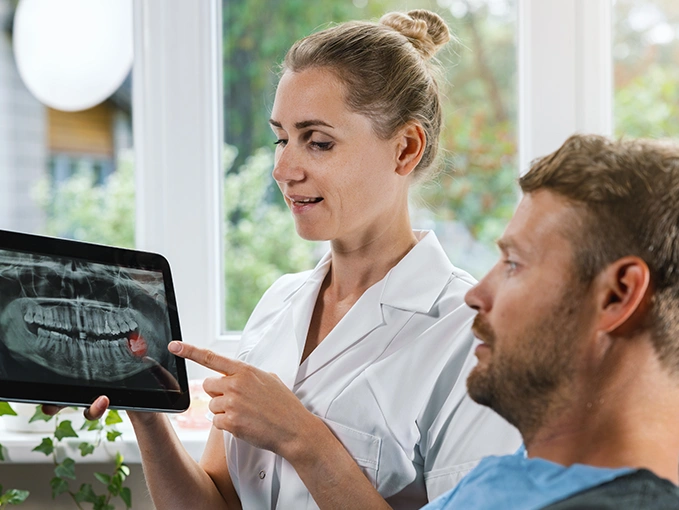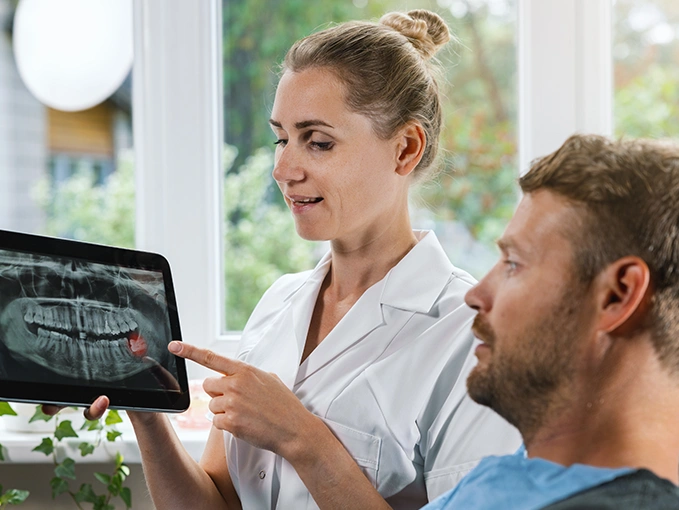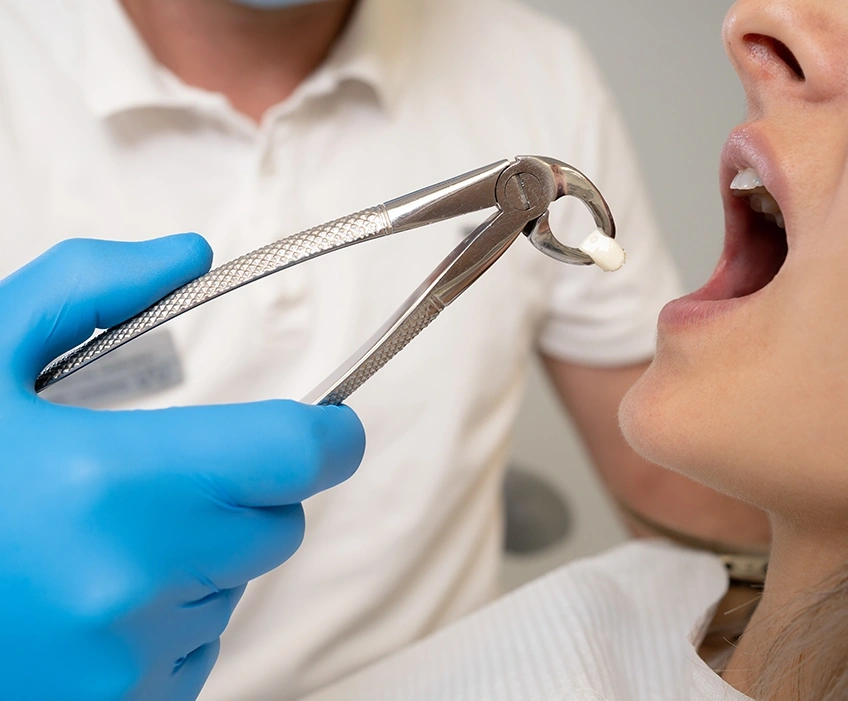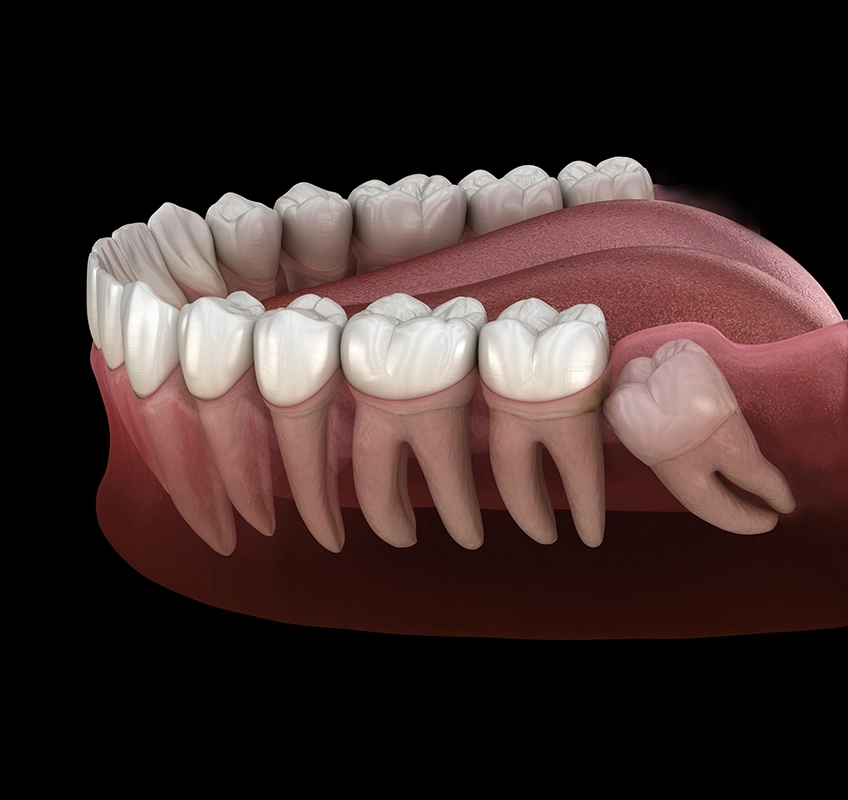Wisdom Teeth Removal in London
Our Bayswater dental Clinic Dentists offer cost effective one or more of your third molars taken out or Wisdom tooth removal in London. This can be done by our wisdom tooth extraction dentist in London and this process might involve a surgical procedure.
Wisdom teeth come through from late teenage years to mid-twenties. Sometimes they do not erupt properly (they are impacted). Impacted wisdom teeth can cause further issues such as pain, swelling and infection. To treat these symptoms and prevent further oral health issues, your dentist might recommend the removal of wisdom teeth.

Why Would I Need to Have My Wisdom Teeth Removed?
It is not always necessary that wisdom teeth have to be extracted. For a lot of people, wisdom teeth come through properly and do not cause any issues. However, as wisdom teeth are the last teeth to come through, there’s often not enough or no space in your mouth for them to come out and grow. This means that they can get stuck in your gums or grow at an awkward angle. This is called an impacted wisdom tooth. Even impacted wisdom teeth do not always need to be removed if they are not causing any problems.
However, the way or the angle an impacted wisdom tooth is growing can make it easy for food and bacteria to get trapped around the gum or underneath a gum flap. This can lead to swollen and sore gums (pericoronitis), infection and tooth decay. If the impacted wisdom tooth starts causing pain or problems with your gums or other teeth, your dentist might recommend wisdom tooth extraction.
Having your wisdom teeth removed is one of the most common dental procedures done in the UK. It is usually done in the late teens or early to mid-twenties when the wisdom teeth are coming out.
What are The Alternatives to Wisdom Teeth Extraction?
If your wisdom teeth are not causing any symptoms or further complications, even if they’re impacted, then they would not need to be removed.
If there is a high risk of the nerves around your wisdom tooth to be managed, your dentist might recommend a coronectomy. A coronectomy is a procedure where the crown of the tooth is taken out but some of the wisdom tooth root is left in place. This procedure might reduce the risk of nerve damage.
Your dentist might also cut some of the gum tissue to remove and prevent food from being trapped. Trapped food can cause bacteria to grow and causes infection.
Your dentist would be able to advise on the best and most suitable treatment.

Your dentist will perform an X-ray before a wisdom tooth extraction so that they can see the exact position of the wisdom tooth in the gum. The X-ray will allow your dentist to plan how to remove the tooth. Often, wisdom tooth extraction is a straightforward procedure that your dentist will be able to complete under local anaesthesia at the dental practice.
It the wisdom tooth extraction looks like it will be more difficult, your dentist might need to refer you to a specialist oral surgeon. Then, the wisdom tooth removal procedure would be performed in a hospital and you may be offered general anaesthesia. Before your operation, it is important that you follow your dentist or surgeon’s advice.
Your dentist, nurse or a surgeon will inform you what will happen during the wisdom tooth removal procedure. If you are not sure about anything, ask.
What Is The Procedure For Wisdom Teeth Removal?
The procedure of wisdom teeth removal depends on the difficulty of taking out your teeth. Wisdom teeth in the upper jaw are normally easier to remove than the ones in the bottom. Your dentist can advise what you can expect during wisdom teeth extraction.
Usually, wisdom teeth removal happens under local anaesthesia. The local anaesthetic will make the area around the wisdom tooth numb and will block the pain, but you stay awake during the procedure. If you are worried about pain, talk to your dentist. They will be able to advise on the best approach.
What To Expect Afterwards Wisdom Teeth Removal?
What you should do after wisdom teeth removal depends on the level of anaesthesia. Your dentist will be able to tell you what to do after wisdom teeth removal.
After having local anaesthesia, it may take several hours before you can feel in the side of your face and your jaw. You should take special care not to bump or knock the area. You shouldn’t eat or drink anything for the first six hours after the procedure. You might experience some discomfort as the anaesthetic wears off but your dentist will offer you pain relief as you need it.
Your dentist will advise you on what aftercare you should do after wisdom teeth removal. They can give you some painkillers and mouthwash to use or advise you on what you should buy to help with recovery. Your dentist might also prescribe antibiotics if there are signs of an infection.
Pain Relief
The full recovery after wisdom teeth removal might take a few days. There will likely be some pain and discomfort, which is usually worse in the first couple of days. You can take over-the-counter painkillers such as paracetamol or ibuprofen to manage the pain, Sometimes the two kinds of painkillers work well together. If you need any advice ask your pharmacist or dentist.
Along with some pain, you may also have some swelling and stiffness in your jaw for a couple of days. Sometimes, this can make it difficult for you to open your mouth. To reduce the swelling, you can apply an ice pack wrapped in a towel.
Keeping the wound clean
Rinsing out your mouth regularly will keep the wound after wisdom tooth removal clean and help with healing. You should not rinse your mouth during the first 24 hours as it may cause bleeding. After the first 24 hours, you should rinse your mouth gently after eating with an antibacterial mouthwash or salt water. This will help get rid of food and stop bacteria growing.
You should brush your teeth as normal, gradually getting closer to the wound as it recovers. If your wound starts bleeding after the procedure. You can bite into a handkerchief. If your wound is bleeding, avoid very hot or cold food as the bleeding might start again.
Eating and drinking
In the first few hours after wisdom tooth extraction, you should avoid eating or drinking. For the first few days after the procedure, you should have soft or liquid foods only. After that, you will be able to return to your usual diet but in the beginning, you should avoid chewing on the areas where your wisdom tooth was extracted. In the first 24 hours after wisdom teeth removal, you should avoid alcohol, hot and cold drinks. You shouldn’t eat or drink at all for the first few hours after the operation. Then, for the first few days, stick to soft or liquid foods only. You can gradually return to your usual diet, but to begin with, try not to chew on the areas of your mouth that are healing. It’s best if you avoid alcohol or very hot or cold drinks for the first 24 hours.

Are There Any Side-Effects of Wisdom Teeth Removal?
There might be some temporary side-effects after wisdom teeth extraction. The main ones include:
- Pain, swelling and bruising around the jaw
- Difficulty opening your mouth
- Tiredness
- Sensitive teeth around where the tooth was removed
- Bad breath
Any of the side effects should get better two or three days after your wisdom teeth are removed.

What Are Some Complications of Wisdom Teeth Removal?
Rarely there might be issues occurring after wisdom teeth extraction. These might include:
- Infection around the area where your wisdom tooth was removed.
- Accidental damage to teeth close to that area.
- Dry socket – when a blood cloth covering the wound comes off and exposes bone and nerves underneath. This can cause some pain and bad breath.
- Damage to nerves, which can cause pain, tingling, pins and needles and numbness.
- A broken jaw, although this is very rare.
Most patients do not experience any complications after wisdom teeth removal. If you experience any of the mentioned symptoms, you should talk to your dentist.
- Monday 09:00AM - 08:00PM
- Tuesday 09:00AM - 08:00PM
- Wednesday 09:00AM - 08:00PM
- Thursday 09:00AM - 08:00PM
- Friday 09:00AM - 08:00PM
- Saturday 09:00AM - 08:00PM
- Sunday 09:00AM - 04:00PM







